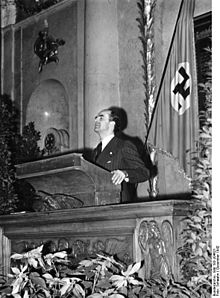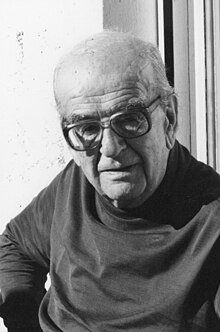Ernesto Grassi

Ernesto Grassi (born May 2, 1902 in Milan , † December 22, 1991 in Munich ) was an Italian philosopher.
Life
The existentialist Grassi, son of a German mother and an Italian father, taught philosophy at Italian and German universities for many decades . In 1925 he received his doctorate under Piero Martinetti at the University of Milan . In Aix-en-Provence he heard Maurice Blondel . During a tour of Germany he got in touch with Heinrich Rickert , Karl Jaspers , Nicolai Hartmann , Max Scheler and Martin Heidegger . In 1928 he went to Heidegger in Freiburg (Breisgau), where he taught until 1938 as a lecturer for Italian and a lecturer in philosophy.
On December 31, 1932, Grassi received the license to teach ( libera docenza ) for the history of philosophy from the Italian Ministry of Education . He held his first course as a private lecturer at the State University of Milan, but after he came to power , Grassi returned to Freiburg in May 1933. In 1938 he went to Berlin, where his honorary professorship, awarded in Freiburg in 1938, was relocated in 1939. In 1941 an article appeared in Alfred Rosenberg's magazine National Socialist monthly issue . In 1942 he founded the Studia Humanitatis Institute in Berlin. From 1943 to 1944 he stayed in northern Italy, then in Switzerland; here he held a teaching position in Zurich from 1946 to 1949. In 1947 he was responsible for the publication of Heidegger's letter of humanism, Heidegger's first publication after the Second World War. In 1948 he founded the Centro italiano di studi umanistici e filosofici in Munich , which he also headed, and was full professor here from 1948 to 1970, then emeritus at the Ludwig Maximilians University . From 1965 he also headed the seminar for philosophy and intellectual history of humanism at the university. Stephan Otto was his successor on the chair . He was also involved in the reconstruction of the Petrarca Institute in Cologne alongside Fritz Schalk . He was considered one of the most thorough connoisseurs of Italian humanism . In Germany he was best known as the editor of Rowohlt's German Encyclopedia , which began in 1955 with a book by the National Socialist art historian Hans Sedlmayr .
selected Writings
- Il problema della metafisica platonica. Laterza, Bari 1932.
- The primacy of the logo. The problem of antiquity in the conflict between Italian and German philosophy. Beck, Munich 1939.
- Thoughts on the poetic and the political. Two lectures to determine the spiritual tradition of Italy. Verlag Helmut Küpper, Berlin 1939.
- Defense of individual life. Studia humanitatis as a philosophical tradition. Francke, Bern 1946.
- Travel without arriving. South American meditations. Rowohlt, Hamburg 1955. New edition: Rüegger, Diessenhofen 1982.
- Art and Myth. Rowohlt, Hamburg 1957. 2nd edition: Suhrkamp, Frankfurt am Main 1990. Revised new edition, edited by Richard Blank and Emilio Hildalgo-Serna: Alexander Verlag, Berlin 2014, ISBN 978-3-89581-312-2 .
- The second explanation. Encyclopedia Today. Lexical index for volumes 1-75. Rowohlt Taschenbuch Verlag, Hamburg 1958.
- The theory of the beautiful in antiquity. DuMont, Cologne 1962. New edition 1980.
- Power of the image. Powerlessness of rational language. To save the rhetorical. DuMont, Cologne 1970. 2nd edition: Fink, Munich 1979.
- Humanism and marxism. On the criticism of the independence of science. Rowohlt, Reinbek 1973.
- The power of the imagination. On the history of occidental thought. Athenaeum, Königstein / Ts. 1979, also 1991.
- Introduction to philosophical problems of humanism. Wissenschaftliche Buchgesellschaft, Darmstadt 1986. 2nd edition 1991 under the title Introduction to humanistic philosophy. Primacy of the word.
- The unheard-of metaphor. Edited and with a bibliography by the author by Emilio Hidalgo-Serna. Verlag Anton Hain, Frankfurt am Main 1992, ISBN 3-445-08569-2 .
literature
- Sonja Asal, Annette Meyer (Eds.): Ernesto Grassi in Munich . Wilhelm Fink Verlag, Munich 2020.
- Eberhard Bons : The philosopher Ernesto Grassi . Fink, Munich 1990.
- Wilhelm Büttemeyer: Ernesto Grassi - Humanism between Fascism and National Socialism. 2nd Edition. Alber, Freiburg im Breisgau 2010, ISBN 978-3-4954-8321-3 (with bibliography up to 1948).
- Jörg Döring , Sonja Lewandowski, David Oels (eds.): Rowohlts German Encyclopedia. Science in paperback 1955–68 (= Non Fiktion. Arsenal der other genres 12.2, 2017). Wehrhahn, Hannover 2017, ISBN 978-3-86525-582-2 .
- Emilio Hidalgo-Serna (Ed.): Studi in memoria di Ernesto Grassi. 2 volumes. La Città del Sole, Napoli 1996, with a detailed bibliography.
- Robert Josef Kozljanic: Ernesto Grassi Fink, Munich 2003, ISBN 3-7705-3824-2 .
- Robert Josef Kozljanic: Art and Myth. Life-philosophical study of Ernesto Grassi's concept of primal reality . Igel, Hamburg 2001, ISBN 3-89621-134-X .
Web links
- Literature by and about Ernesto Grassi in the catalog of the German National Library
- Entry in Enciclopedia multimediale delle scienze filosofiche with picture
- Standard entry at the Servizio Bibliotecario Nazionale (SBN)
- Writings by Ernesto Grassi in the Italian central catalog of the SBN
Individual evidence
- ↑ Humanism under National Socialism . In: Information Philosophie, 3/2011, p. 52.
- ↑ Ernesto Grassi: The examination of German philosophy in Italy . In: National Socialist monthly issue 12, 1941, pp. 898–911
- ↑ Philosophisches Jahrbuch 92 (1985) 211.
| personal data | |
|---|---|
| SURNAME | Grassi, Ernesto |
| BRIEF DESCRIPTION | Italian philosopher |
| DATE OF BIRTH | May 2, 1902 |
| PLACE OF BIRTH | Milan |
| DATE OF DEATH | December 22, 1991 |
| Place of death | Munich |
